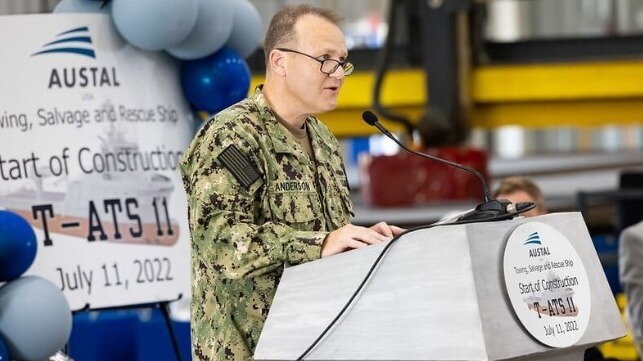New Competitor: Austal USA Starts Building its First Steel Ship

Australian shipbuilder Austal is known as the biggest aluminum shipbuilder in the world, but its American division is headed towards steel. On Monday, Austal USA celebrated the start of construction for a new fleet tug for the U.S. Navy - the first vessel on the yard's all-new steel production line.
After production of the aluminum-hulled Independence-class Littoral Combat Ship series winds down in the middle of the decade, the yard's government-vessel pipeline looks like it will be increasingly focused on steel hulls. With $50 million in support from the Pentagon, Austal USA has invested in a full-scale steel construction division. It now has a new 170,000 square foot, enclosed facility for steel shipbuilding, including computerized and robotic steel processing equipment. Austal USA plans to take the manuacturing process it has used for previous aluminum vessel classes and transfer it to steel work, including modular construction and moving assembly lines.

that matters most
Get the latest maritime news delivered to your inbox daily.
The brand new division holds the contract for two steel fleet tugs for the Navy and - as of this month - a series of up to 11 steel/aluminum Offshore Patrol Cutters for the U.S. Coast Guard. Austal obtained the OPC series in a recompete of a contract previously held by Eastern Shipbuilding Group, the original yard for the vessel.
“It seems like only yesterday we were breaking ground on our steel shipbuilding facility and here we are, a little over a year later, beginning construction on our first steel ship,” Austal USA VP of New Construction Dave Growden said. “Our shipbuilders are excited to demonstrate how effectively their talent and our proven processes translate to steel production.”
For a steelcutting ceremony for a fleet tug, Monday's event attracted outsize attention. Speakers included Rear Admiral Thomas J. Anderson - the U.S. Navy’s top acquisition officer for destroyers, amphibs, frigates and all other non-nuclear craft. Austal's ambitions extend beyond patrol ships and tugs: it is widely expected to compete for a "follow-yard" contract to build the future Constellation-class frigate for the U.S. Navy, in parallel with Fincantieri Marinette Marine.
